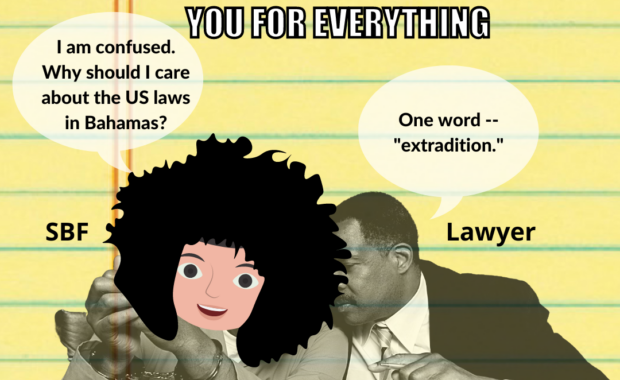It’s
been
quite
a
week
for
Stefan
Passantino,
the
former
White
House
ethics
lawyer
who
went
on
to
represent
the
Trump
campaign,
members
of
the
Trump
family,
and
Cassidy
Hutchinson,
the
former
Mark
Meadows
aide
whose
blockbuster
testimony
rocked
the
January
6
Select
Committee
hearings
this
summer.
On
Monday,
at
the
conclusion
of
the
final
public
hearing,
Rep.
Zoe
Lofgren
alluded
to
a
witness
whose
lawyer
tried
to
manipulate
her
testimony
to
help
Donald
Trump
and
his
allies
hide
the
truth
about
the
events
leading
up
to
the
Capitol
Riot.
Approximately
five
minutes
later,
Passantino’s
bio
disappeared
from
the
website
of
his
law
firm
Michael
Best.
Then
yesterday,
CNN confirmed
that
Lofgren
was
referring
to
him.
And
today
the
committee
released
Hutchinson’s
transcript
of
a
interview
she
gave
in
September
describing
her
interactions
with
Passantino.
It’s…
a
lot.
So
we’re
going
to
structure
this
post
like
a
mini-MPRE
issue
spotter
exam.
Given
the
allegations
laid
out
in
this
testimony,
let’s
see
how
many
potential
problems
we
can
spot
in
these
few
excerpts.
Ready?
Let’s
not
make
this
whole
attorney-client
thing too
formal,
it
ruins
the
magic,
right?
He
had
called
and
let
me
know
that
he
was
my
attorney.
And
it
was
a
really
brief
call.
And
that
–
in
that
–
on
that
call,
though,
I
had
asked
him
who
–
well,
I
had
asked
him
about
signing
the
engagement
letter,
because
I
had
said,
“This
would
be
great
if
we
can
meet
in
person
soon.”
My
document
deadline
date
at
that
time
was,
I
believe,
Tuesday,
February
8th.
I
let
him
know
that,
and
I
was
like,
“I
probably
should
sign
an
engagement
letter.
And
he
said,
“No,
no,
no.
We’re
not
doing
that.
Don’t
worry.
We
have
you
taken
care
of.”
And
I
said
–
remember
asking
him,
“I
don’t
have
to
sign
an
engagement
letter?”
Because
that
was
sort
of
the
first
alarm
bell
in
my
head
that
went
off,
because
I
wanted
something
in
writing
for
myself,
because
I
already
was
–
I
kind
of
sometimes
have
a
tendency
to
overthink
things.
And
I
had
never
had
to
retain
an
attorney
before.
But
do
know
enough
to
know
that
you
are
—
you
should
be
signing
an
engagement
letter.
Some
things
are
better
left
a
mystery.
Like
who’s
paying
for
representation.
So
then
I
had
asked
him,
“All
right.
Well,
that’s
perfectly
fine.
Would
you
mind
letting
me
know
where
the
funding
for
this
is
coming
from?
I
want
to
thank
them.
want
to
thank
whoever
it
is,
because
I’m
just
trying
to
kind
of
like
figure
things
out.”
And
he
said,
“If
you
want
to
know
at
the
end,
we’ll
let
you
know,
but
we’re
not
telling
people
where
funding
is
coming
from
right
now.
Don’t
worry,
we’re
taking
care
of
you.
Like,
you’re
never
going
to
get
a
bill
for
this,
so
if
that’s
what
you’re
worried
about.
I
was
like,
“Okay.
That’s
what
I
was
worried
about.”
Wasn’t
the
only
thing
I
was
worried
about.
The
substance
of
your
testimony,
though,
should
be
a
mystery
to
exactly
no
one
in
Trumpland.
Hutchinson:
Later
that
day,
sort
of
put
together
that
the
“they”
he
was
referring
to
then
were
Justin
Clark,
Alex
Cannon,
Eric
Herschmann.
I
think
that’s
–
yeah,
I
think
that’s
all
of
them.
Rep.
Cheney:
And
how
did
you
put
that
together?
Hutchinson:
Because
he
–
he
had
said
that
—
Justin
—
yeah,
Justin
Clark.
Stefan
had
told
me
that
–
towards
the
end
of
the
day
that
because
he
was
involved
with
Elections,
LLC,
and
tangentially,
I
guess
Trump’s
PACs,
he
had
law
partners.
And
unless
I
was
extremely
unwilling
for
him
to
share,
he
said
it
would
be
natural
for
him
to
have
to
share
that
information
with
the
people
that
he
works
with
that
are
his
partners
that
are
involved
in
Trump
world.
Don’t
print
out
your
calendar.
Or
think
too
hard.
And
he
had
said.
“Well,
we’re
not
building
out
timelines.
So,
unless
you
remember,
like,
a
very
specific
day
with
a
very
specific
event,
like,
“I
don’t
recall’
is
your
answer.
So
that’s
when
he
sort
of
—
sort
of
had
went
into
the
“I
don’t
recalls.”
And
he
said,
“If
you
don’t
100
percent
recall
something,
even
if
you
don’t
recall
a
date
or
somebody
who
may
or
may
not
have
been
in
the
room,
that’s
an
entirely
fine
answer,
and
we
want
you
to
use
that
response
as
much
as
you
deem
necessary.”
I
said.
“But,
if
I
do
recall
something
but
not
every
little
detail,
Stefan,
can
I
still
say
I
don’t
recall?”
And
he
had
said,
“Yes.
And
I
said,
“But
if
I
do
remember
things
but
not
every
little
detail,
and
I
say
I
don’t
recall,
wouldn’t
I
be
perjuring
myself?”
And
he
had
—
Stefan
had
said
something
to
the
effect
of,
“The
committee
doesn’t
know
what
you
can
and
can’t
recall,
so
we
want
to
be
able
to
use
that
as
much
as
we
can
unless
you
really,
really
remember
something
very
clearly.
And
that’s
when
you
give
a
short,
sweet
response.
The
less
you
remember
the
better.
I
don’t
think
you
should
be
filling
in
any
calendars
or
anything.”
Who’s
the
client
here?
And
in
that
same
conversation,
he
said,
“So
if
you
have
any
conversations
with
any
of
them,
especially
Eric
Herschmann,
we
want
to
really
work
to
protect
Eric
Herschmann.
And
I
remember
saying
sarcastically
to
him,
“Eric
can
handle
himself.
Eric
has
his
own
resources.
Why
do
I
have
to
protect
Eric?”
He
said,
“No,
no,
no.
Like,
just
to
keep
everything
straight,
like,
we
want
to
protect
Eric
with
all
of
this.”
No,
but
seriously,
WHO
IS
THE
CLIENT?
And
he
kept
saying
to
me,
like,
“Cass,
you’re
a
good
person.
I
don’t
want
you
to
feel
like
you
have
to
bear
the
weight
of
responsibility
for
all
these
other
people.
Like,
the
committee
is
talking
to
so
many
people
that,
even
if
you
were
entirely
forthcoming
with
them,
they’re
going
to
have
all
this
by
the
end
from
someone
else
anyway.
I
don’t
want
you
to
be
put
through
the
ringer
on
this.
It’s
not
fair
to
you.
It’s
not
fair
that
Mark
put
you
in
this
position.
We
just
want
to
focus
on
protecting
the
President.
We
all
know
you’re
loyal.
Let’s
just
get
you
in
and
out,
and
this
day
will
be
easy,
I
promise.
Like,
you
really
have
nothing
to
worry
about.”
Oh,
right.
The
client
is
the
one
who
calls
the
shots.
He
was
like,
“But,
if
we
–
if
we
even
think
about
engaging
with
them,
there
is
no
way
that
we
can
do
this
without
a
second
subpoena.
Trump
world
will
not
continue
paying
your
legal
bills
if
you
don’t
have
that
second
subpoena.”
So
that
was
the
first
moment
in
my
mind
where
I
had
it
sort
of
corroborated.
Now,
I
had
had
my
strong
suspicions
that
the
funding
was
coming
from
Trump
world.
He
never
gave
any
indication
that
it
was,
the
actual
financials
of
it
was
coming
from
Trump
world,
until
he
said
it
that
night.
The
client
is
the
one
who
gets
kept
abreast
of
the
details
of
her
case
and
gets
to
decide
if
she
wants
to
risk
going
to
jail
or
not.
Stefan
texted
me
Monday,
June
6th,
in
the
morning.
He
said,
“With
DOJ
refusing
to
hold
Mark
and
Scavino
in
contempt
and
with
the
committee
talking
about
you
to
the
press
again,
I
don’t
see
why
we
do
anything
more
with
them.
There’s
a
small
element
of
risk
to
refusing
to
cooperate,
but
I
think
it’s
the
best
move
for
you.
Do
you
agree?”
I
said,
“Did
they
reach
out
about
a
live
hearing?
I
don’t
want
to
gamble
with
being
held
in
contempt,
Stefan.
I’m
sorry,
but
I
just
don’t
think
I
can
do
it.”
It’s
not
a
lie
if
it’s
…
circumstantial?
He
was
like,
“Did
you
overhear
things?”
And
I
said,
“Yes.
And
he
said,
“Were
you
in
the
meetings?”
I
said.
“Not
all
of
them,
but
I
was
in
some
of
them.”
He
was
like,
“Well,
if
you
had
just
overheard
conversations
that
happened,
you
don’t
need
to
testify
to
that.”
“So,
if
I
overheard
it
from
a
Member,
do
I
have
to?”
And
he
said,
“It’s
circumstantial.
We
can
talk
about
it.”
So
I
said,
“Okay.”
It’s
not
a
lie
if
…
they
can’t
prove
it?
I
looked
at
Stefan,
and
I
said,
“Stefan,
I
am
fucked.”
And
he
was
like,
“Don’t
freak
out.
You’re
fine.”
I
said.
“No,
Stefan,
I’m
fucked.
I
just
lied.”
And
he
said,
“You
didn’t
lie.
I
said,
“No,
Stefan.
Do
you
know
how
many
times
they
just
asked
me
that
question?
I
just
lied.”
And
he
said,
“They
don’t
know
what
you
know,
Cassidy.
They
don’t
know
that
you
can
recall
some
of
these
things.
So
you
saying
‘I
don’t
recall’
is
an
entirely
acceptable
response
to
this.”
He’s
like,
“They’re
prodding.
They
want
there
to
be
something.
They
don’t
know
that
there
is
something.
We’re
not
going
to
give
them
anything
because
this
is
not
important.
You’re
doing
great.
You’re
doing
fine.
You’re
doing
exactly
what
you
should
be
doing.”
Okay,
pencils
down.
WOW.
Transcript
Elizabeth
Dye lives
in
Baltimore
where
she
writes
about
law
and
politics.




 Olga
Olga
 Jill
Jill









 Chris
Chris


